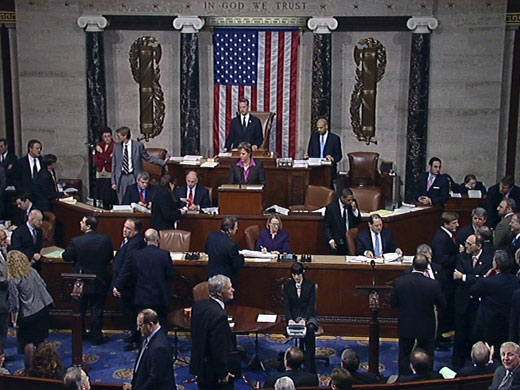The public’s opinion of U.S. Congress has reached historic lows. And, according to some surveys, opinions have declined substantially in recent years. In early 2015, 22 percent of the public gave a favorable opinion of Congress – down from 41 percent in early 2010 and 53 percent in early 2007, a national survey from the Pew Research Center found.
Conflict within Congress is well known as partisan battles over spending nearly led to another government shutdown on the last day of the fiscal year in September 2015. Days later, disagreements over whether to admit 10,000 Syrian refugees into the country next year began raising the possibility of a shutdown again.
There is ample research on how public opinion influences politics and public policy and how the actions of Congress impact public approval. A 2015 study in the Proceedings of the National Academy of Sciences of the United States of America (PNAS) looks at the issue from another angle — how the words used by individual members of Congress affect approval ratings. Researchers from five universities analyzed all 124 million words spoken during in-session speeches of the U.S. House of Representatives from January 1996 through November 2014 and compared their analysis against public-approval data from Gallup surveys. The resulting report, “A Decline in Prosocial Language Helps Explain Public Disapproval of the U.S. Congress,” considers the link between legislative conversations about helping others and approval ratings. The researchers focused on how often House members used one of 127 “prosocial” words or word stems that include “assist,” “collective,” “compassion,” “interact,” “trust” and “volunteer.”
Findings include:
- Public approval and Congress’ use of prosocial language followed the same trajectory during the time period studied. When legislators used more prosocial language, approval ratings increased. When prosocial language fell, so did public approval.
- There is a time lag associated with prosocial language and approval ratings. The words used in Congressional speeches predicted what Congressional approval ratings would look like 29 weeks into the future.
- The words that most strongly predicted approval were “gentle,” “involve,” “educate,” “contribute,” “concerned,” “give,” “tolerate,” “trust,” and “cooperate.”
- Congress’ use of prosocial language also predicted positive media coverage.
This study suggests that the decline in public disapproval is connected at least in part to a decline in the use of prosocial words on the House floor. Previous research has established that prosocial language can impact an audience’s opinion of a speaker. “Our findings suggest that this phenomenon generalizes to the real world and can help explain how legislative bodies gain the confidence of the governed,” the authors state.
Related research: A 2014 report from the Congressional Research Service, “Shutdown of the Federal Government: Causes, Processes, and Effects,” explains what occurs during such a work stoppage and the effects of previous government shutdowns. A 2014 study in Perspectives on Politics indicates that “economic elites and organized groups representing business interests have substantial independent impacts on U.S. government policy, while average citizens and mass-based interest groups have little or no independent influence.”
Keywords: U.S. Congress, language, impression formation, public approval, government shutdown, citizen input, positive psychology, LIWC, linguistic inquiry and word count, frequency-dependent words, word frequency, prosocial language


Expert Commentary